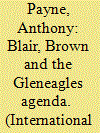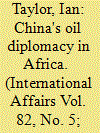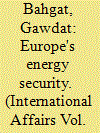|
|
|
Sort Order |
|
|
|
Items / Page
|
|
|
|
|
|
|
| Srl | Item |
| 1 |
ID:
074592


|
|
|
|
|
| Publication |
2006.
|
| Summary/Abstract |
In a series of speeches, statements and interviews in early 2005 Tony Blair and Gordon Brown set out an ambitious agenda of global development change for the UK's Presidency of the G8. The Gleneagles summit, held in July of that year, did make a number of significant policy commitments in the areas of trade, finance and the environment. But, with the passage of time and as the details were worked out, many of these turned out to be much less far-reaching than the claims initially made by the two politicians. The Gleneagles agenda could never, in fact, have worked to 'make poverty history', because such an achievement was simply not within the compass of the G8 to deliver. The global politics of development is not animated by what the 'North' is or is not willing to do for the 'South'. It is instead worked out within the context of a global politics of unequal development that neither Blair nor Brown appear to comprehend.
|
|
|
|
|
|
|
|
|
|
|
|
|
|
|
|
| 2 |
ID:
074593


|
|
|
|
|
| Publication |
2006.
|
| Summary/Abstract |
Within the next five years, Chinese trade with Africa is predicted to reach $100 billion per year. Much of this springs from China's growing expansion into Africa's oil markets. It is argued that Chinese oil diplomacy in Africa has two main goals: in the short-term to secure oil supplies to help feed growing domestic demand back in China; and in the long-term, to position China as a global player in the international oil market. Yet at the same time, this oil safari is being accompanied by an explicit stance that emphasizes state sovereignty and 'non-interference' in domestic affairs and is wholly disinterested in transparency or human rights. Consequently, Beijing has increasingly been accused of turning a blind eye to autocracy and corruption. China is also threatening to undercut efforts by the African Union and its western partners to make government and business more accountable. While China is providing investment where little was previously forthcoming, concerns about Beijing's engagement with Africa's oil industries need to be resolved, not least by African leaders themselves.
|
|
|
|
|
|
|
|
|
|
|
|
|
|
|
|
| 3 |
ID:
074594


|
|
|
|
|
| Publication |
2006.
|
| Summary/Abstract |
The extreme volatility of global energy markets since the early 2000s has prompted the Commission of the European Communities to issue a new Green Paper, 'A European strategy for sustainable, competitive and secure energy'. This important document seeks to identify the main steps EU members need to take to enhance their energy outlooks. The first section in this article discusses the concept 'energy security'. This is followed by an examination of Europe's energy mix (oil, natural gas, coal, nuclear power and renewables). The third section analyses European efforts to establish and strengthen energy partnerships with Russia, the Caspian Sea region and the Middle East. In other words, the article seeks to examine Europe's efforts to diversify its energy mix and energy sources. The main argument is that stability and predictability in energy markets are shared goals between producing regions and major consumers.
|
|
|
|
|
|
|
|
|
|
|
|
|
|
|
|
| 4 |
ID:
074588


|
|
|
|
|
| Publication |
2006.
|
| Summary/Abstract |
Weak early compliance with the Kyoto Protocol's current emissions reduction targets and the longer term impact of the US's defection point to emerging problems for the Protocol's effectiveness and legitimacy. This article argues that such problems could in part be addressed by shifting the emphasis of negotiations over the Protocol's second commitment period away from attempts to reengage the United States. Instead, these negotiations and key actors like the European Union should aim for a framework and 'culture of compliance' that actively engage the 'emergent major emitters', China, India and Brazil, either by including them in the Protocol's Annex B list of states, or in a new annex created specially to accommodate them.
|
|
|
|
|
|
|
|
|
|
|
|
|
|
|
|
| 5 |
ID:
074589


|
|
|
|
|
| Publication |
2006.
|
| Summary/Abstract |
Even before the Doha Round of international trade talks in the World Trade Organisation (WTO) had been suspended in July 2006, there was little sign of progress in the negotiations on the relationship between WTO rules and multilateral environmental agreements (MEAs). If the Round is resumed, this and many other important issues on the WTO agenda will have to take a back seat while the big ticket items-agriculture and market access-are resolved. Meanwhile, governments acting outside the WTO will continue to agree to new MEA commitments that relate to trade policy without a clear understanding of how the design and implementation of those commitments is affected by WTO rules. This article examines some of the options for governments to clarify the relationship between WTO rules and ME As, both inside and outside the WTO. It sets out the nature and experience of the relationship, before examining ways in which governments in the WTO and in the UN system could work towards better global governance of trade and sustainable development.
|
|
|
|
|
|
|
|
|
|
|
|
|
|
|
|
|
|
|
|
|